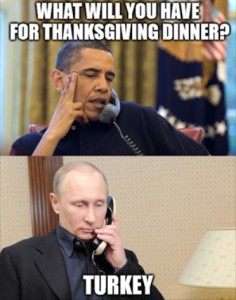
Turkey and Thanksgiving
Prior to thanksgiving, people are looking for -

-—————————————–
On the first topic, the following story came on the top. It is noteworthy for what passes as ‘science’ this days (shown in emphasis below).
Brining turkey is the worst, according to science
As BuzzFeed showed in a 13-person taste test, a brined turkey may be moist, but it is also flavorless and boring. The skin doesnt crisp. The taste doesnt wow. But that leaves home chefs with a problem: How do you get a turkey that is both juicy and flavorful?
-——————————————
On the third topic -
Turkish Shootdown of Russian Jet: What You Need to Know
A U.S. official told Reuters that the Russian jet was inside of Syria when it was shot down:
The United States believes that the Russian jet shot down by Turkey on Tuesday was hit inside Syrian airspace after a brief incursion into Turkish airspace, a U.S. official told Reuters, speaking on condition of anonymity.
Russia denies that the Russian fighter jet which was bombing ISIS ever entered Turkish air space, and has put out its own map purporting to prove that claim.
The Russian jet pilots who parachutted free of their burning plane were then purportedly killed by Turkish rebels inside Syria. If true, this is a war crime.
Then when a Russian helicopter tried to save the pilots it was shot down by American-backed Syrian rebels using weapons provided to them by the United States and a Russian marine was killed.
Russia is deploying a warship off the Syrian coast to destroy any threats to Russian planes. Many believe this is the start of World War III.
While the U.S. and NATO tried to blame Russia, German Vice-Chancellor Sigmar Gabriel slammed Turkey:
This incident shows for the first time that we are to dealing with an actor who is unpredictable according to statements from various parts of the region that is not Russia, that is Turkey, Gabriel said, as cited by DPA news agency. He added that Turkey was playing a complicated role in the Syrian conflict.
Indeed, NATO-member Turkey is MASSIVELY supporting ISIS, provided chemical weapons used in the jihadis massacre of civilians, and has been bombing ISIS main on-the-ground enemy Kurdish soldiers using its air force. And some of the Turkish people are also unsympathetic to the victims of ISIS terrorism.Turkey was also instrumental in the creation of ISIS. An internal Defense Intelligence Agency (DIA) document produced recently shows, the U.S. knew that the actions of the West, Gulf countries and Turkey in Syria might create a terrorist group like ISIS and an Islamic CALIPHATE.
As the former DIA head explained:
It was a willful decision [by Turkey, the West and Gulf countries] to support an insurgency that had salafists, Al Qaeda and the Muslim Brotherhood .
It was a willful decision [by Turkey, the West and Gulf countries] to support an insurgency that had salafists, Al Qaeda and the Muslim Brotherhood .
-——————————————
On link between Thanksgiving Turkey and the country Turkey, here is an interesting factoid - The bird is called ‘hindi’ (means Indian) in Turkey.
The Mistake That Gave Turkey (the Bird) the Same Name as Turkey (the Nation)
The former center of the Ottoman Empire isnt exactly a breeding ground for the bird that Americans associate with Thanksgiving. In fact, the turkey is native to North America, so why do they share the same name?
First, lets get the facts on the two turkeys. The word turkey has been used to refer to land occupied by the Turks since the 1300s and was even used by Chaucer in The Book of the Duchess. The word Turk is of unknown origin, but it is used in such varying languages as Italian, Arabic, Persian, and many others to refer to people from this region. The land occupied by the Turks was known as the Ottoman Empire from the 1300s until 1922. Following World War I and the fall of the Ottomans, the republic of Turkey was declared, taking on the name that had long referred to that region. The bird is another story. Meleagris gallopavo is an odd-looking bird that is known for its bare head, wattle, and iridescent plumage.
How are they related? First, we have to get to know another bird: the guinea fowl. This bird bears some resemblance to the then-recently found American bird. Though it is native to eastern Africa, the guinea fowl was imported to Europe through the Ottoman Empire and came to be called the turkey-cock or turkey-hen. When settlers in the New World began to send similar-looking fowl back to Europe, they were mistakenly called turkeys.
Every language seems to have radically different names for this bird. The Turkish word is hindi, which literally means Indian. The original word in French, coq dInde, meant rooster of India, and has since shortened to dinde. These names likely derive from the common misconception that India and the New World were one and the same. In Portuguese, its literally a Peru bird, and in Malay, its called a Dutch chicken.
The turkeys acceptance into the Old World happened quickly. By 1575, the English were enjoying the North American bird at Christmas dinner, and Shakespeare talked about it in Henry IV. Turkeys, as we know them, have fared better than their guinea fowl relatives on the international scene, perhaps explaining why you probably have never heard of guinea fowl until right now.
